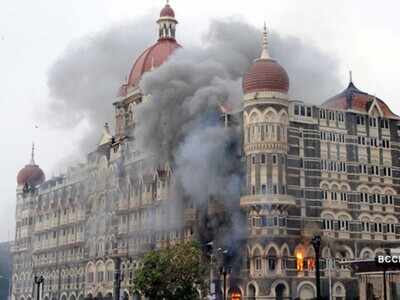
After years of delay, the protracted trial of the Mumbai attacks accused in Pakistan could finally see some progress. India has offered to host a judicial commission from Pakistan after Islamabad sent a list of 27 witnesses the anti-terror court hearing the case wants to examine, ToI has learnt.
While Islamabad reiterated a few weeks ago its demand that the witnesses travel to Pakistan for examination, India has said that they will testify only to a visiting Pakistan judicial commission or through a video conference.
Pakistan is also said to have conveyed to India that the witnesses have to testify within 90 days as per a court directive.
For India, however, it's important that the witnesses record their statements in an atmosphere free of any fear or intimidation. The government in any case isn't sure how serious Pakistan is about the exercise, given the inordinate delay on the part of local authorities in taking the trial to its logical conclusion.
For now though, the government doesn't want Pakistan to further delay the trial citing lack of support from India, especially when it continues to mount pressure on Pakistan diplomatically to move ahead with the trial. The need for Pakistan to bring the Mumbai attacks accused to justice has continued to figure in India's engagements with all major powers. The India-US joint statement after the Modi-Trump summit earlier this year, while calling upon Pakistan to ensure that no territory under its control was used to launch terrorist attacks, again asked Islamabad to expeditiously bring to justice the perpetrators of Mumbai and Pathankot attacks.
A Pakistani judicial panel had visited Mumbai in 2013 too to examine the witnesses. The defence lawyers though managed to get the trial court to quash the panel's findings, as they claimed that the witnesses were not allowed to be cross-examined by the panel.
The Mumbai trial was initiated after Pakistan in 2009 arrested 7 men directly involved in the terror attack, including LeT commander Zaki-ur-Rehman Lakhvi. Frequent transfer of judges who were apparently reluctant to hear the case, witnesses too afraid to depose and lack of cooperation from the Pakistan government are said to be some of the reasons for the trial dragging on for 11 years.
While the anti-terrorism court hearing the case and prosecution has said in the past that that Indian witnesses' testimonies are essential to bring the trial to an end, India has remained sceptical about the outcome. This has mainly to do with Pakistan's refusal to take serious action against JuD chief and UN-designated global terrorist Hafiz Saeed whom India describes as the mastermind of the Mumbai attacks. Lakhvi too managed to get bail in 2015.
Pakistan claims there is not enough action to book Saeed in the Mumbai case. Indian officials though felt vindicated again earlier this year after a US State Department spokesperson was quoted as saying that Saeed had to be held accountable for his involvement in the planning of numerous acts of terrorism "including 2008 Mumbai attacks" that killed 166 innocent people, including 6 Americans.
Saeed has recently been booked on charges of terror-financing though with Pakistan apparently working to avoid being blacklisted by the FATF. In fact, he was in February said to have been sentenced to 11 years in prison. India has repeatedly told Pakistan that all evidence against Saeed and others have already been provided to Pakistan and that it's for the government to work on it and bring the perpetrators to justice.
Apart from Lakhvi, Abdul Wajid, Mazhar Iqbal, Hamad Amin Sadiq, Shahid Jameel Riaz, Jamil Ahmed and Younis Anjum are facing charges of abetment to murder, attempted murder, planning and executing the 2008 attacks.
While Islamabad reiterated a few weeks ago its demand that the witnesses travel to Pakistan for examination, India has said that they will testify only to a visiting Pakistan judicial commission or through a video conference.
Pakistan is also said to have conveyed to India that the witnesses have to testify within 90 days as per a court directive.
For India, however, it's important that the witnesses record their statements in an atmosphere free of any fear or intimidation. The government in any case isn't sure how serious Pakistan is about the exercise, given the inordinate delay on the part of local authorities in taking the trial to its logical conclusion.
For now though, the government doesn't want Pakistan to further delay the trial citing lack of support from India, especially when it continues to mount pressure on Pakistan diplomatically to move ahead with the trial. The need for Pakistan to bring the Mumbai attacks accused to justice has continued to figure in India's engagements with all major powers. The India-US joint statement after the Modi-Trump summit earlier this year, while calling upon Pakistan to ensure that no territory under its control was used to launch terrorist attacks, again asked Islamabad to expeditiously bring to justice the perpetrators of Mumbai and Pathankot attacks.
A Pakistani judicial panel had visited Mumbai in 2013 too to examine the witnesses. The defence lawyers though managed to get the trial court to quash the panel's findings, as they claimed that the witnesses were not allowed to be cross-examined by the panel.
The Mumbai trial was initiated after Pakistan in 2009 arrested 7 men directly involved in the terror attack, including LeT commander Zaki-ur-Rehman Lakhvi. Frequent transfer of judges who were apparently reluctant to hear the case, witnesses too afraid to depose and lack of cooperation from the Pakistan government are said to be some of the reasons for the trial dragging on for 11 years.
While the anti-terrorism court hearing the case and prosecution has said in the past that that Indian witnesses' testimonies are essential to bring the trial to an end, India has remained sceptical about the outcome. This has mainly to do with Pakistan's refusal to take serious action against JuD chief and UN-designated global terrorist Hafiz Saeed whom India describes as the mastermind of the Mumbai attacks. Lakhvi too managed to get bail in 2015.
Pakistan claims there is not enough action to book Saeed in the Mumbai case. Indian officials though felt vindicated again earlier this year after a US State Department spokesperson was quoted as saying that Saeed had to be held accountable for his involvement in the planning of numerous acts of terrorism "including 2008 Mumbai attacks" that killed 166 innocent people, including 6 Americans.
Saeed has recently been booked on charges of terror-financing though with Pakistan apparently working to avoid being blacklisted by the FATF. In fact, he was in February said to have been sentenced to 11 years in prison. India has repeatedly told Pakistan that all evidence against Saeed and others have already been provided to Pakistan and that it's for the government to work on it and bring the perpetrators to justice.
Apart from Lakhvi, Abdul Wajid, Mazhar Iqbal, Hamad Amin Sadiq, Shahid Jameel Riaz, Jamil Ahmed and Younis Anjum are facing charges of abetment to murder, attempted murder, planning and executing the 2008 attacks.
Download
The Times of India News App for Latest India News

Coronavirus outbreak
Trending Topics
LATEST VIDEOS
India
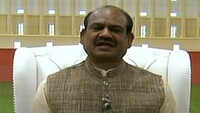 Om Birla inaugurates Kerala Legislative Assembly's TV channel
Om Birla inaugurates Kerala Legislative Assembly's TV channel  2 bodies recovered from Singara river in Assam’s Lakhimpur
2 bodies recovered from Singara river in Assam’s Lakhimpur 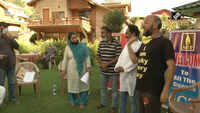 Kashmiri artists reviving theatre culture amid Covid-19
Kashmiri artists reviving theatre culture amid Covid-19  Chhattisgarh: HIV positive girl children forcibly evacuated by police from Bilaspur shelter-home
Chhattisgarh: HIV positive girl children forcibly evacuated by police from Bilaspur shelter-home 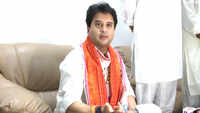 Scindia takes dig at Congress over Kamal Nath and Shashi Tharoor’s contradictory statements on Rajiv Gandhi
Scindia takes dig at Congress over Kamal Nath and Shashi Tharoor’s contradictory statements on Rajiv Gandhi 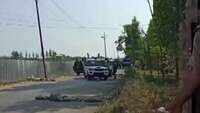 J&K: Top LeT commander Sajjad alias Haider killed in Baramulla encounter
J&K: Top LeT commander Sajjad alias Haider killed in Baramulla encounter
More from TOI
Navbharat Times
Featured Today in Travel
Quick Links
Coronavirus in MumbaiCoronavirus in KolkataCoronavirus in HyderabadCoronavirus in DelhiCoronavirus in BangaloreCoronavirus symptomsCoronavirus in IndiaWhat is CoronavirusCoronavirus NewsSolar EclipseNPRWhat is NRCCAB BillCAB and NRCRTI BillPodcast newsLok SabhaShiv SenaYSRCPCongressBJP newsUIDAIIndian ArmyISRO newsSupreme Court
Get the app



